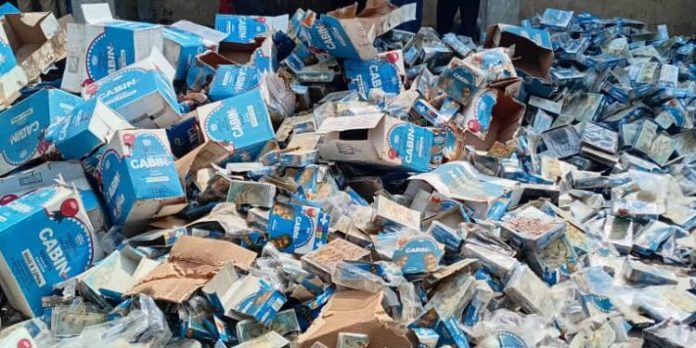The National Agency for Food and Drug Administration and Control (NAFDAC) seals a warehouse in Kaduna for storing expired food and cosmetic products valued at over N75 million.
The agency announces this enforcement action on its official X handle, stating that the warehouse is located at PP2A Bayajidda Street by Kano Road, New Ogbomosho Road. The operation follows a tip-off from a concerned citizen, prompting NAFDAC officials to conduct a raid.
During the raid, NAFDAC officials catch workers repackaging expired biscuits into sacks. Other expired items found in the warehouse include dairy milk, vegetable oil, soft drinks, and detergents.
NAFDAC confirms the arrest of the warehouse’s managing director for questioning. The agency stresses that strict regulatory actions will follow upon completion of the investigation to deter similar violations.
The agency urges the public to remain vigilant and report suspicious products or activities to the nearest NAFDAC office.
Recent Enforcement Actions
- NAFDAC shuts down a pharmacy on Onitsha Crescent, Area 11, Garki, Abuja, for selling expired and unregistered drugs.
- The enforcement team discovers expired products worth over N7 million, including “H-Pylori” test kits, which pose serious health risks.
- The pharmacy’s managing director and superintendent pharmacist are arrested for further investigation.
- Since November 26, 2024, NAFDAC implements guidelines for handling and disposing of unwholesome medicines and other regulated products, including food, drugs, medical devices, and cosmetics.
- The agency mandates that no regulated product be manufactured, imported, exported, sold, or used in Nigeria without NAFDAC registration.
- Products classified as unwholesome include expired, improperly stored, damaged, counterfeit, or unregistered items. Facilities handling such products must maintain proper inventory records.
NAFDAC’s Commitment to Public Safety
NAFDAC’s Director-General, Prof. Mojisola Adeyeye, reaffirms the agency’s commitment to ensuring the safety, efficacy, and quality of regulated products. She emphasizes that enforcing best practices, monitoring the supply chain, and upholding safety standards remain key priorities in protecting public health in Nigeria.













